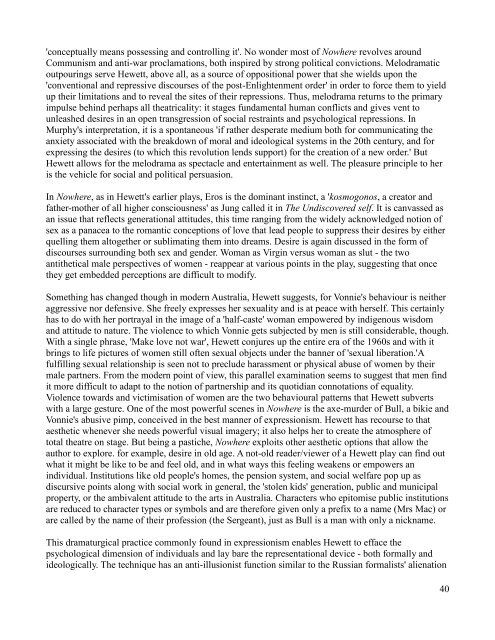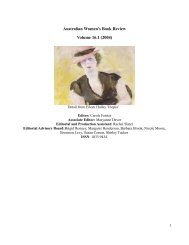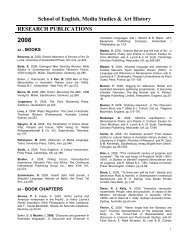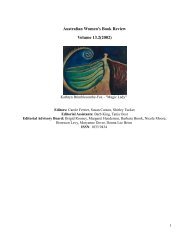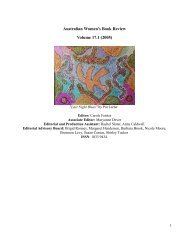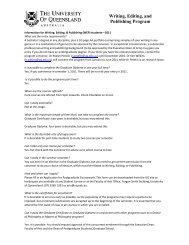Australian Women's Book Review Volume 14.1 - School of English ...
Australian Women's Book Review Volume 14.1 - School of English ...
Australian Women's Book Review Volume 14.1 - School of English ...
Create successful ePaper yourself
Turn your PDF publications into a flip-book with our unique Google optimized e-Paper software.
'conceptually means possessing and controlling it'. No wonder most <strong>of</strong> Nowhere revolves around<br />
Communism and anti-war proclamations, both inspired by strong political convictions. Melodramatic<br />
outpourings serve Hewett, above all, as a source <strong>of</strong> oppositional power that she wields upon the<br />
'conventional and repressive discourses <strong>of</strong> the post-Enlightenment order' in order to force them to yield<br />
up their limitations and to reveal the sites <strong>of</strong> their repressions. Thus, melodrama returns to the primary<br />
impulse behind perhaps all theatricality: it stages fundamental human conflicts and gives vent to<br />
unleashed desires in an open transgression <strong>of</strong> social restraints and psychological repressions. In<br />
Murphy's interpretation, it is a spontaneous 'if rather desperate medium both for communicating the<br />
anxiety associated with the breakdown <strong>of</strong> moral and ideological systems in the 20th century, and for<br />
expressing the desires (to which this revolution lends support) for the creation <strong>of</strong> a new order.' But<br />
Hewett allows for the melodrama as spectacle and entertainment as well. The pleasure principle to her<br />
is the vehicle for social and political persuasion.<br />
In Nowhere, as in Hewett's earlier plays, Eros is the dominant instinct, a 'kosmogonos, a creator and<br />
father-mother <strong>of</strong> all higher consciousness' as Jung called it in The Undiscovered self. It is canvassed as<br />
an issue that reflects generational attitudes, this time ranging from the widely acknowledged notion <strong>of</strong><br />
sex as a panacea to the romantic conceptions <strong>of</strong> love that lead people to suppress their desires by either<br />
quelling them altogether or sublimating them into dreams. Desire is again discussed in the form <strong>of</strong><br />
discourses surrounding both sex and gender. Woman as Virgin versus woman as slut - the two<br />
antithetical male perspectives <strong>of</strong> women - reappear at various points in the play, suggesting that once<br />
they get embedded perceptions are difficult to modify.<br />
Something has changed though in modern Australia, Hewett suggests, for Vonnie's behaviour is neither<br />
aggressive nor defensive. She freely expresses her sexuality and is at peace with herself. This certainly<br />
has to do with her portrayal in the image <strong>of</strong> a 'half-caste' woman empowered by indigenous wisdom<br />
and attitude to nature. The violence to which Vonnie gets subjected by men is still considerable, though.<br />
With a single phrase, 'Make love not war', Hewett conjures up the entire era <strong>of</strong> the 1960s and with it<br />
brings to life pictures <strong>of</strong> women still <strong>of</strong>ten sexual objects under the banner <strong>of</strong> 'sexual liberation.'A<br />
fulfilling sexual relationship is seen not to preclude harassment or physical abuse <strong>of</strong> women by their<br />
male partners. From the modern point <strong>of</strong> view, this parallel examination seems to suggest that men find<br />
it more difficult to adapt to the notion <strong>of</strong> partnership and its quotidian connotations <strong>of</strong> equality.<br />
Violence towards and victimisation <strong>of</strong> women are the two behavioural patterns that Hewett subverts<br />
with a large gesture. One <strong>of</strong> the most powerful scenes in Nowhere is the axe-murder <strong>of</strong> Bull, a bikie and<br />
Vonnie's abusive pimp, conceived in the best manner <strong>of</strong> expressionism. Hewett has recourse to that<br />
aesthetic whenever she needs powerful visual imagery; it also helps her to create the atmosphere <strong>of</strong><br />
total theatre on stage. But being a pastiche, Nowhere exploits other aesthetic options that allow the<br />
author to explore. for example, desire in old age. A not-old reader/viewer <strong>of</strong> a Hewett play can find out<br />
what it might be like to be and feel old, and in what ways this feeling weakens or empowers an<br />
individual. Institutions like old people's homes, the pension system, and social welfare pop up as<br />
discursive points along with social work in general, the 'stolen kids' generation, public and municipal<br />
property, or the ambivalent attitude to the arts in Australia. Characters who epitomise public institutions<br />
are reduced to character types or symbols and are therefore given only a prefix to a name (Mrs Mac) or<br />
are called by the name <strong>of</strong> their pr<strong>of</strong>ession (the Sergeant), just as Bull is a man with only a nickname.<br />
This dramaturgical practice commonly found in expressionism enables Hewett to efface the<br />
psychological dimension <strong>of</strong> individuals and lay bare the representational device - both formally and<br />
ideologically. The technique has an anti-illusionist function similar to the Russian formalists' alienation<br />
40


